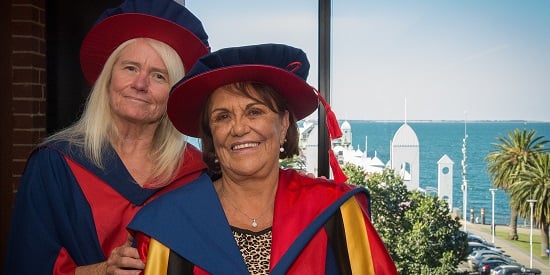Institute of Koorie Education congratulates PhD graduates
Media releaseThe first students to complete a PhD exclusively through Deakin University's Institute of Koorie Education (IKE) have become two of just over 400 Indigenous Australians to hold a doctorate.
One of the two mature age graduates, Shirley Bennell (pictured right, with her PhD supervisor, Dr Selma Macfarlane, Lecturer in Social Work), received her doctorate 53 years after leaving school in 1964 at 15 years of age due to various reasons.
A proud Nyungar woman from south Western Australia and married mother of four, Mrs Bennell returned to study through the TAFE Aboriginal Access program in 1982 before completing a Bachelor of Arts at Edith Cowan University in 1988, a Bachelor of Applied Science in Community Health at Curtin University in 1996, a Masters through a federal government initiative Coordinated Care Program at Curtin University in 2005, and a Graduate Diploma in Cultural Resource Management at IKE in 2010.
She began researching for a doctorate through IKE in 2012 and chose to document her family’s lived experience through the generations as it endured past government policies of discrimination and injustice in Western Australia.
“I see it as a record for the generations to come; a way for us to look at what our ancestors have done and achieved and where we are now,” Mrs Bennell said.
“I wanted to rewrite my own truthful family history. It’s a story of more than survival – it’s a story of thriving as we lived in two worlds, a black world and a white world.
“The only way I could tell this story was by merging my Indigenous knowledge and storytelling with my western education. I believe that a western education can be a powerful tool, especially when combined with cultural wisdom, knowledge and experience.”
As Mrs Bennell uncovered her family history, she learned more about what the Nyungar people endured at the hands of various Australian governments.
“I initially thought our families weren’t affected by the government policies as we grew up but the more I discovered, the more I realised how wrong I was,” Mrs Bennell said.
“I still remember the welfare people coming to my school, more so than at home, when we were kids.
“When I looked up the official files about my loving parents, they were filled with such cruel, hurtful words that it was like a wave crashing over me. I was devastated by what was said about them.
“My father made choices, as the opportunities arose, to make the policies work for him and his family. For example, he chose to apply for the citizenship rights to be recognised as a citizen in his own country (Australia) that would give him some of the same equalities as European people.
“My parents taught us how to live in two worlds and I passed this on to our families so they could face the two worlds and make our own journeys through life.”
Mrs Bennell’s life could have easily been defined by discrimination but a strong character and sheer determination to gain new knowledge and share it kept her going throughout her studies.
“Ever since I was a kid, I’ve been determined to be treated equally and known that I’m just as intelligent as anyone sitting in my high school classroom, despite what others said or thought,” Mrs Bennell said.
“My thesis was an opportunity to investigate and write my family history through my lived experience. It took me on a rollercoaster ride I never thought I could go on and when it got tough, I believe I was spiritually guided by my ancestors to keep going.”
IKE Director Professor Liz Cameron congratulated the two women on becoming the Institute’s first PhD graduates in 11 years.
“A key focus of Indigenous leaders today is to increase the aspirations of our people and one powerful way to do that is through education. If we don’t step up and, through sheer determination and resilience, reach for a better education, we’ll never be able to make change.”
Professor Cameron said that Deakin University had the highest number of Indigenous students of any Victorian university, thanks largely to the Institute.
“We’re finding that many of our students over the age of 30 opted to withdraw from high school education at an early age.
“The Institute is also attracting increasing numbers of mature aged students and students from rural and remote areas who value the opportunity to maintain their community and family obligations alongside their studies.
“If not for the Institute, a lot of these students would not have the opportunity to further their education.”
Share this story

